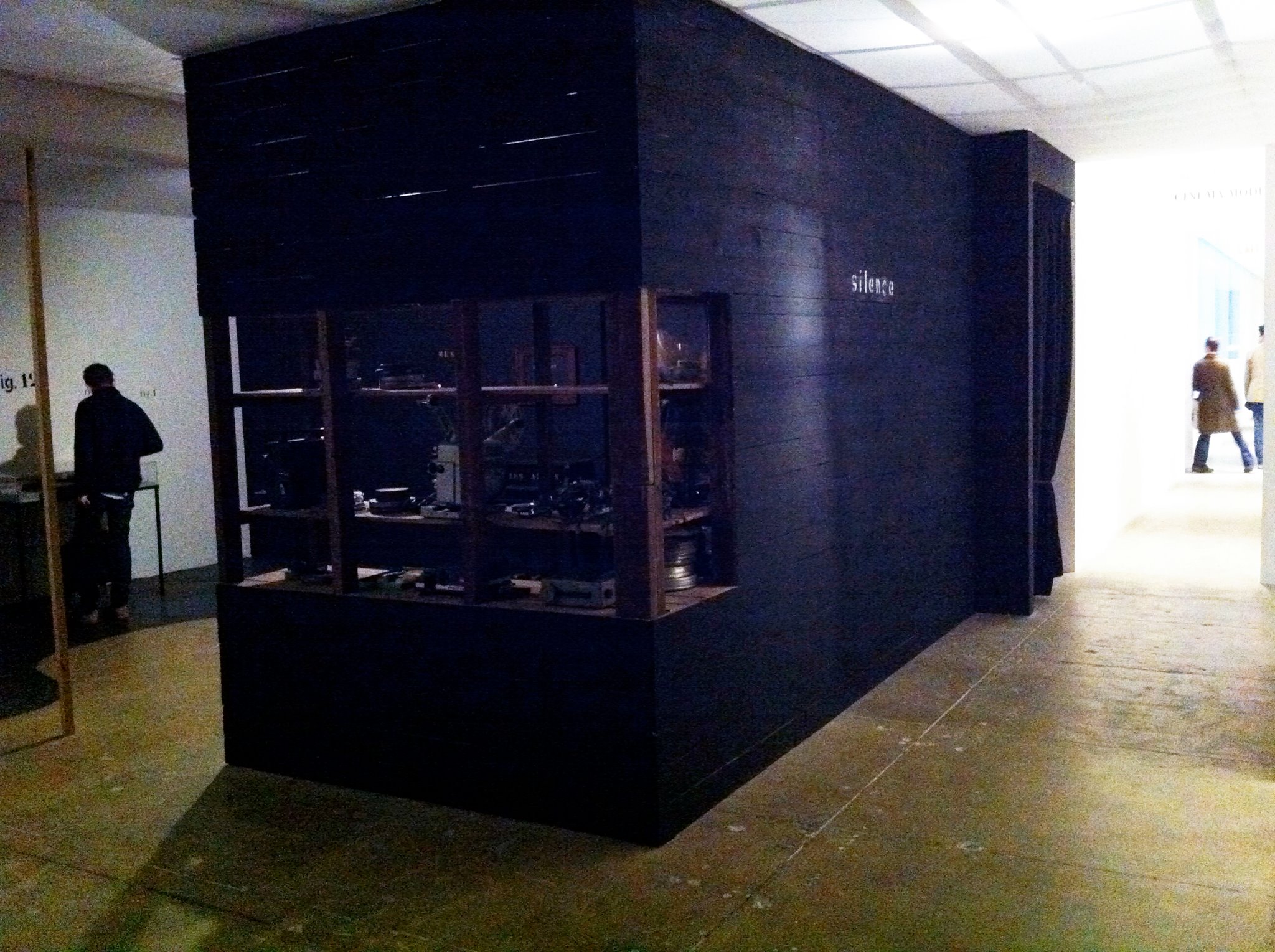
Vincent Johnson
:
A Peculiar Adventure
In October 2010, I was fortunate to have been able to see Marcel Broodthaer’s historic Section Cinema 72 exhibition at Marian Goodman Gallery in New York. The gallery space had been cleared out and converted to look as much like the original installation as possible when it debuted four decades ago. There was a distinct, powerful aura of the artist present in the space, which was further activated by those of us in attendance—each visitor feeling their way about in the darkened central theater. There was also a sense of being on an adult treasure hunt, or of somehow finding oneself in the apartment of an art historical celebrity, one who had his own permanent, mythic status.
In a text Broodthaers published in conjunction with the Documenta 5 version of this piece, he wrote: “This museum is a fiction. In one moment it plays the role of a political parody of artistic events, in another that of an artistic parody of political events.”
Over time—meaning now—I have come to believe that Broodthaers was speaking to the history of 20th century art via the platform and concepts of 19th century French poetics; which he himself internalized and advanced into the future by formalizing their visual ascensions and pushing back against other vital modalities of modernity. Broodthaers was the consummate literary outsider who had worked in a Brussels art museum and understood how the machine that makes museums presents its art narratives. He spoke to the history of Paris and the forefront of international contemporary art from Brussels, even though Paris had stopped listening. In Germany, Cologne’s art scene was running on full power; Cologne heard Broodthaers speak after he made that city his home. I am always struck by his good fortune of having the intellectual and creative firestorm that was Cologne so welcoming and nearby, when Brussels appeared to be a non-factor in the creation of art as an idea.
With his 2016 MoMA retrospective, a full unveiling of his art actions should finally unfold before those who might best be able to reassess the primal achievements of this artist, who brought the visionary approaches developed in French literature into the field and practice of art, while at once using this understanding to create the primary critique of the art museum and its narrative fantasies. This might be a peculiar adventure, for often it is assumed that because of Manet's advent of modernity in visual terms, France's visual art is its most forward advance. In fact, France's greatest modern achievements may actually be in literature, the arc from Diderot through Camus—Marcel Duchamp and that Spaniard Picasso be damned. France may actually be much closer to Great Britain in being a nation primarily of literary ideas.
Los Angeles. January 7, 2016
A Peculiar Adventure
In October 2010, I was fortunate to have been able to see Marcel Broodthaer’s historic Section Cinema 72 exhibition at Marian Goodman Gallery in New York. The gallery space had been cleared out and converted to look as much like the original installation as possible when it debuted four decades ago. There was a distinct, powerful aura of the artist present in the space, which was further activated by those of us in attendance—each visitor feeling their way about in the darkened central theater. There was also a sense of being on an adult treasure hunt, or of somehow finding oneself in the apartment of an art historical celebrity, one who had his own permanent, mythic status.
In a text Broodthaers published in conjunction with the Documenta 5 version of this piece, he wrote: “This museum is a fiction. In one moment it plays the role of a political parody of artistic events, in another that of an artistic parody of political events.”
Over time—meaning now—I have come to believe that Broodthaers was speaking to the history of 20th century art via the platform and concepts of 19th century French poetics; which he himself internalized and advanced into the future by formalizing their visual ascensions and pushing back against other vital modalities of modernity. Broodthaers was the consummate literary outsider who had worked in a Brussels art museum and understood how the machine that makes museums presents its art narratives. He spoke to the history of Paris and the forefront of international contemporary art from Brussels, even though Paris had stopped listening. In Germany, Cologne’s art scene was running on full power; Cologne heard Broodthaers speak after he made that city his home. I am always struck by his good fortune of having the intellectual and creative firestorm that was Cologne so welcoming and nearby, when Brussels appeared to be a non-factor in the creation of art as an idea.
With his 2016 MoMA retrospective, a full unveiling of his art actions should finally unfold before those who might best be able to reassess the primal achievements of this artist, who brought the visionary approaches developed in French literature into the field and practice of art, while at once using this understanding to create the primary critique of the art museum and its narrative fantasies. This might be a peculiar adventure, for often it is assumed that because of Manet's advent of modernity in visual terms, France's visual art is its most forward advance. In fact, France's greatest modern achievements may actually be in literature, the arc from Diderot through Camus—Marcel Duchamp and that Spaniard Picasso be damned. France may actually be much closer to Great Britain in being a nation primarily of literary ideas.
Los Angeles. January 7, 2016